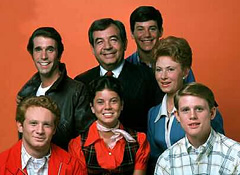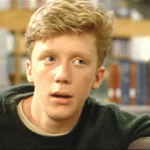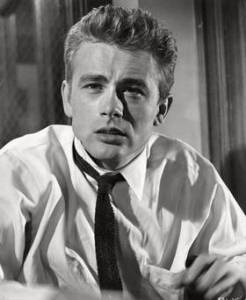James Dean had it. Lou Reed had it. Patti Smith has it. Ralph Wiggum doesn’t have it and nor did my high school maths teacher. What is it? I’m talkin’ about cool, that’s what I’m talkin’ about.
Cool is an adjective and a noun. You can be it, and you can have it, but just like hipsters never admit to being hipsters, no-one, perhaps apart from The Fonz, ever lays claim to being cool. Because to show you had any investment in being cool, would, like, definitely not be cool. So what exactly does cool mean?
It’s not unusual for the meaning of a word in the English language to evolve through the centuries. According to this article in Slate, use of the word cool (originally col) to mean a temperature that is neither too hot nor too cold can be traced back to the 9th Century in the English language. Use of the same word to convey the diminishing of heated emotion first pops up in the 10th century, in Beowulf.
By the 16th century, cool had fully evolved from an adjective of the atmosphere around us to one of the attributes within, suggesting deliberation, rationality, and calmness.(1)
In 2014, this humble, 4 letter, 1 syllable word holds many different meanings, as seen by this extensive listing in the Merriam Webster Dictionary:
cool:
– moderately cold : lacking in warmth
– made of a light, thin material that helps you stay cool
– able to think and act in a calm way : not affected by strong feelings
– marked by steady dispassionate calmness and self-control<a cool and calculating administrator
– lacking ardor or friendliness <a cool impersonal manner>
– of a color : producing an impression of being cool; specifically : of a hue in the range violet through blue to green
slang:
a : very good : excellent; : all right
b : fashionable, hip
One little word, so many meanings. It’s not surprising that earlier ideas all bubbled up together to form yet another layer of meaning that is elusive to define: the “slang” referred to above, used by anyone and everyone, from those in their mid 60s, down to pre-teens, to mean
hip, trendy, desirable –
– eg Frankie magazine is so cool!
or, to mean everything you have just said perfectly meets what is required in this situation.
– eg, Yep, that’s all cool!
Exactly when, and where, cool aspired to more than mere composure—to an alluring mix of style, hipness, poise, and who knows what else—is impossible to determine…(2)
According to Slate, this use may have first cropped up in the 19th Century, when a (very patronising) study on African Americans noted their use of the phrase “Dat’s cool!” (with no explanation of the context or meaning). By the 1920’s the word was used in jazz lyrics and by the 1940s was commonly associated with jazz culture. (3)
By the 1950s the word was taken up by a newly recognised demographic – the teenager – to describe someone who was fashionable, hip, very good, excellent and alright. The best example of cool entering straight into mainstream popular culture is probably that All-American sitcom set in the naively idyllic 1950s (although made in the cynical, disillusioned late-1970s), Happy Days.

Pic: TV Series Finale
Fonzie: Like I always say, you live fast, you die young, you leave a good-looking corpse
Potsie: Hey, that’s cool.
Richie: Nick Romano said that in Knock on Any Door.
Fonzie: I think I said it better. (3)
In the late seventies, The Fonz was a role model for teenagers in how to be cool, 50s style. Slick back your hair, address adults in a way that an older generation might have found disrespectful, (“Mr C”), convey your approval with a thumbs-up gesture combined with saying “Heeeeeyyyyy!” – or better yet, develop a catch-phrase, like Sit On It! The boys at my primary school took note, and made use of those phrases at every available opportunity. For the rest of us, Ritchie, Ralph and Potsie, and daggy little-sister Joanie, gave us hope that we were not the only nerds around, hoping to bask in the glory of occasionally associating with someone cool.
But hang on – wasn’t the coolest thing about Fonzie in the end, the fact that, despite being so cool, he hung out with Richie, Ralph and Potsie? That he involved himself in their little family/suburban dramas without judging them to be beneath him?
Thus we come to the conundrum that is cool.
Cool is not the same as popular, even though the popular kids might not realise this. Cool is not the same as “currently in fashion”. Cool transcends being fashionable. Aiming to be popular is the antithesis of cool. Any being who is truly cool does not care what the rest of the world thinks of them.
It follows, therefore, that the truly cool can hang out with the most uncool people around if they choose to, including Ralph Wiggum, your elderly mum, the IT guy, or the crazy cat woman who lives up the street, and this will not spoil their credentials as cool.
While we are on this topic, perhaps it’s useful to think about characters who are uncool. (A kind of How To Be Uncool Bonus Insert, if you like). Well, traditionally, the opposite of the cool kids has always been the nerds – think of Ralph Wiggum, Millhouse, George Constanza. All insecure, gullible, with little ability to laugh at themselves, and also physically weak, making them a target for teasing or bullies. Millhouse and George both wear glasses, neatly fitting into the stereotype of the nerdy friend in popular culture. Looking back to earlier models for the uncool, we have Ralph and Potsie in Happy Days, or Brian in The Breakfast Club. What makes these characters nerds are the traits they have in common. They are all respectful of authority, and happy to accept what they are told by others – they don’t wish to rock the boat by questioning the status quo. They don’t stand out in a crowd, and don’t wish to.
These characters are nerds. They are geeks. They are the opposite of cool.

Pic: Monologuedb
Yet in recent years there seems to have been a shift in the status of geeks and nerds. In the past 7 years I’ve worked with a few very smart people who I consider to be pretty cool, who are proud (or at least, nonchalant) to claim that they are “database nerds.” It’s no longer embarrassing, in fact it’s empowering, to admit you are an introvert. (“Nah, sorry, I’ve been out twice already this week and I need a quiet night in to recharge.”) There are whole subcultures popping up around previously geeky hobbies such as knitting, home-brewing, baking, and for all I know, probably stamp-collecting. Being a geek is now as cool as it gets – but the truly cool have always known this.
For many decades, the patron saint of cool was James Dean, largely due to the character of Jim Stark he played in Rebel Without A Cause (1955). The depiction of a “rebellious” teenager in that film may seem slightly quaint now, but who is willing to stand up and say that James Dean, or his character Jim Stark, are not cool? Not I, sir.
And what makes Jim cool? It’s because despite being a surly, troubled young man who is misunderstood by his parents and picked on by the popular kids at school, the viewers sees the sincere, vulnerable kid underneath, desperate for understanding from his parents, and willing to befriend and assist another, weaker kid who doesn’t rate amongst the popular kids. (It also helps that he ends up with the girl, of course.)

Pic: Moviemail
Of course all the real-life people I’ve named in this post are in the music or film industry, where they have achieved some level of success (albeit very short-lived in the case of James Dean). If you want to be cool, those are the industries to be in. Another alternative would be to try your hand at being an artist – another person on my list was Andy Warhol. That’s because there’s a possibility of fame, which brings along with it the possibility of being cool. It’s a possibility, but not a given, in my opinion. There are many, many celebrities, but not many who I would describe as cool. Isn’t that right Kim Kardashian?
Of course, you don’t have to be in the film or music or art world to be cool (although it helps.) Earlier I mentioned people that I’d worked with, the self-described “database nerds.” I thought of each of those people (there are 3 I can specifically think of) were cool. All of them liked to party, all of them worked in theatre, all were fun to work with, whilst also being intelligent and hard workers. All of them had, in conversation with me or more profoundly, through their own life choices, shown that they were willing to challenge stereotypes and work to create more understanding about gender/sexuality/disability or other issues. The fact that they described themselves (on separate occasions) as database nerds made the term cool as far as I could see. In the end, perhaps cool is in the eye of the beholder?
So what is cool, and how do you get it?
Well, cool is elusive. When it comes to really defining what makes someone cool, it’s probably best to turn to the words of the one of coolest people in recent history:
I can guess, but I just don’t know. (4)
*
(1) and (2) – Slate – The Birth Of Cool

Well, I’m obviously cool, because I’m a jock. And as a jock, it is my duty to give nerds a hard time.
LikeLike
Sorry, Cutter, but jocks (a great American word to describe a specific type of guy) are not intrinsically cool, in fact just as with celebrities, being a jock comes with no guarantee of coolness and a cool jock is actually a rare breed. The Jock’s favourite pastime of giving nerds a hard time is the proof of that. Just look at some of the headlines that Australian Rules football players achieve outside of the sport – a recent one was a team captain who was arrested for pissing on a police car. On his wedding day. Classy? No. Cool? Uh….no.
If jocks really were cool, they wouldn’t need to give nerds a hard time to feel better about themselves. Did you ever see The Fonz give a nerd a hard time?
LikeLike
You’re saying a lot of things, but all I’m hearing is…NERD!!!!!
LikeLiked by 1 person
I ‘m cool with being called a nerd by a jock. (Short reply so you can read it).
LikeLike
I love your nickname. XD
LikeLike
Are you referring to “Blathering”? It’s from a favourite play of mine, Waiting for Godot where the characters refer to the fact that they’ve been blathering about nothing for the entire play/their entire lives. If I’d thought of it in time, the url of my blog would be BlatheringAboutNothing.wordpress.com, but I don’t want to risk changing the url now in case something goes wrong!
LikeLike
Remember ‘kewl’? I do. LOL That reminds of the old college days in the late nineties
LikeLike
If you are referring to pronunciation, I’m Australian – we still say “Kewl!”
*nasally voice*: “Beeeaa-ewdy mate, that is kewl.” 😉
LikeLike
I was writing something recently and trying to get at how uncool I was, and looked cool up in the Oxford English Dictionary. How funny to think you were doing the same. This is so true: “But hang on – wasn’t the coolest thing about Fonzie in the end, the fact that, despite being so cool, he hung out with Richie, Ralph and Potsie?” Exactly. Cool people don’t have to try to be popular. They are cool because they don’t care if they are:) Leah
LikeLiked by 1 person
Great minds think alike! Or perhaps there is some “cool” zeitgeist in the air. It’s a topic I’ve been thinking about for a while too, but I was thinking of talking about what makes people cool, and how it’s often people I have assumed are way too “cool” to be friends with me, who turn out to be really friendly, non-judgemental people. But this was for a WordPress blogging course I signed up for, and the topic for the week was to write a “How To”….so I started by thinking I’d write a tongue-in-cheek guide to being cool….but then felt like I needed to define what “cool” means (as you did!) and really didn’t get much further than that! Oh well. Maybe there’s a sequel in it.
LikeLike
I enjoyed this analysis of what coolness means to you humans. I especially enjoyed the close reading of the Fonz, with whom I share many attributes, if I do say so myself.
LikeLike
Thanks Albert! It would be interesting to hear a dog’s perspective. I don’t think dogs really care about being cool. They certainly don’t try and hide the fact that they crave love and attention, and love pats, tummy rubs and going for walks. All behaviours which not make it into a guide called “How To Be Cool.”
LikeLiked by 1 person
I’m an IT guy and I’m cool (in my head) 🙂
I find etymology very interesting. For example I’d love to know how “That’s sick!” or “Wicked!” suddenly started meaning something positive.
LikeLiked by 1 person
It’s hard to keep up with what’s an insult or a compliment when a younger generation appropriate words in a different way isn’t it! I think technology is causing language to change rapidly right in front of our eyes, and it’s fascinating to watch.
LikeLike
And here I am wearing 38 leather jackets and smoking 2 packs a day when all I had to do was read this. Thanks!
LikeLiked by 1 person
Haha, if you’re wearing those 38 leather jackets all at once, you will be pretty warm, and probably sweaty, actually. Glad to save you the trouble.
LikeLike
Cool post!
LikeLiked by 1 person